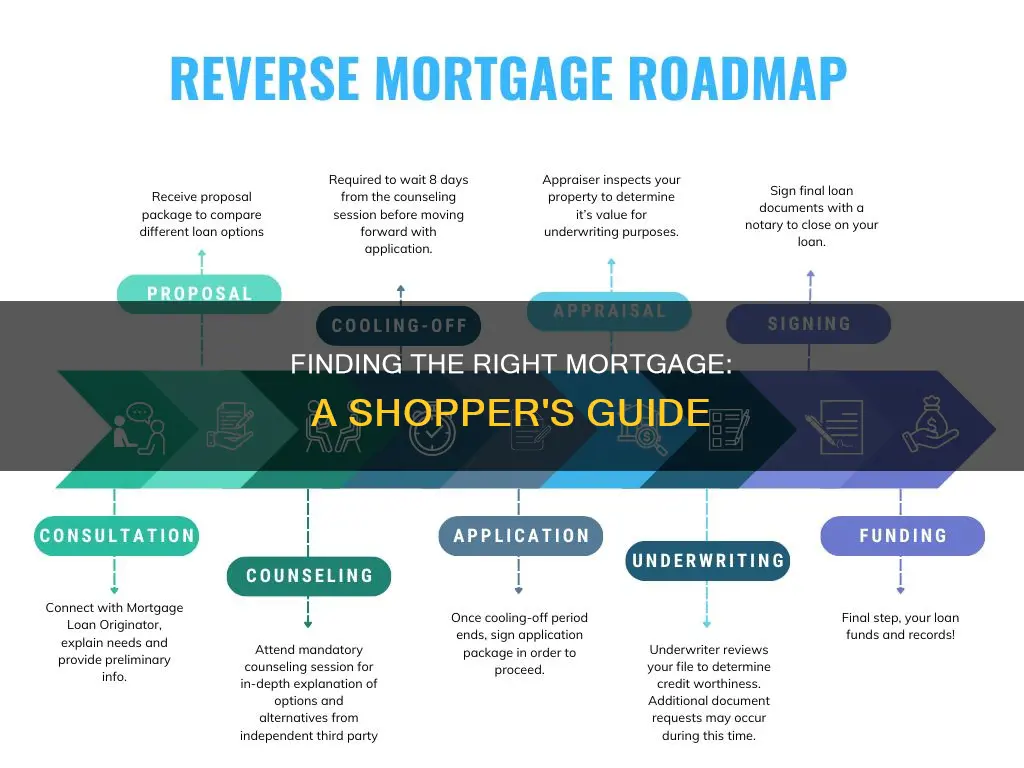
Shopping for a mortgage can be a complex process, but it's important to do your research to ensure you get the best deal. A mortgage is likely to be the largest loan you ever take out, so it's crucial to find a lender that offers the best rate, loan options and customer experience. Before you start, it's a good idea to check your credit score, as this will impact the type of mortgage you can get and the rate you'll receive. You can then approach several lenders for quotes and assess the loan amount, interest rate, loan terms, financial requirements and closing process to find the best fit for you.
| Characteristics | Values |
|---|---|
| Credit score | Check your credit score before shopping for a mortgage. A high credit score demonstrates your reliability and stability as a borrower. |
| Lender | Shop around for the best lender by comparing rates and fees from multiple lenders, including banks, credit unions, online lenders, and brokers. |
| Mortgage broker | A mortgage broker can act as a middleman and shop around for you, but they may not always get the best rates. It is recommended to work directly with a lender. |
| Loan amount | Speak with several lenders to assess the loan amount, interest rate, loan terms, financial requirements, and closing process that fit you best. |
| Down payment | The amount of your down payment can determine the details of the loan you qualify for. A larger down payment can help lower your mortgage rate. |
| Interest rate | Compare interest rates from multiple lenders to get the best deal. |
| Fees | Ask for an itemized summary of estimated fees from each lender to understand the total cost of the loan. |
| Terms | Compare the terms of the loan from different lenders and negotiate for better terms. |
| Customer experience | Consider the customer experience offered by the lender, including their reviews and accolades. |
What You'll Learn

Check your credit score
Checking your credit score is an important step before shopping for a mortgage. Your credit score is a significant factor in your mortgage application, as it indicates your reliability and stability as a borrower to the lender. A high credit score demonstrates your ability to handle debt, which is crucial when applying for a mortgage.
When you apply for a mortgage, lenders will perform a hard pull credit check, which can lower your credit score by several points. Therefore, it is recommended to check your credit score beforehand to ensure you are in a good position to apply. Checking your own credit score does not affect your credit rating, so you can do this without worrying about any negative impact. You can obtain a free copy of your credit report from annualcreditreport.com and review it for any errors or discrepancies. If you identify any issues, it is important to get them corrected as soon as possible.
Additionally, consider any problems you may have had in the past with bill payments due to job loss or high medical expenses. In such cases, you can write a letter to the lender explaining the circumstances of your past credit issues. By providing this context, you can proactively address any concerns they may have and improve your chances of securing a favourable mortgage rate.
Furthermore, be mindful of the number of credit checks you allow when shopping for a mortgage. Multiple inquiries for different types of credit can negatively impact your credit score and hinder your ability to obtain a competitive mortgage rate. Lenders may perceive multiple inquiries within a short period as an indication of high risk. Therefore, it is advisable to minimise the number of credit checks and space them out to avoid any unnecessary damage to your credit score.
Paying Off Your Mortgage: Strategies for Financial Freedom
You may want to see also

Compare rates and fees
When shopping for a mortgage, it's important to compare rates and fees from multiple lenders to get the best deal. Here are some detailed tips to help you navigate the process:
Understand the Different Types of Rates and Fees
Firstly, educate yourself on the different types of rates and fees involved in a mortgage. The interest rate is a crucial factor, as it determines the extra amount you must pay on top of the borrowed sum. The lower the interest rate, the less you'll pay overall. You'll also come across the Annual Percentage Rate (APR), which includes the interest rate and any additional fees, such as closing costs and, in the case of a mortgage, points. The APR is often a more accurate reflection of the total cost of borrowing.
Check Your Credit Score
Your credit score will impact the rates offered to you. Lenders use this score to assess your reliability and stability as a borrower. Generally, a higher credit score will result in more favourable interest rates. Before approaching lenders, it's a good idea to check your credit score and address any issues or discrepancies.
Gather Personalised Rate Quotes
When visiting a lender's website, you'll often see sample rates. These are based on assumptions about a "sample" borrower's credit score, location, and down payment amount. To get a more accurate picture, provide your details, such as your ZIP code, credit score, desired loan amount, and down payment. This will generate a personalised rate quote that better reflects your financial situation.
Compare Multiple Lenders
Don't settle for the first lender you find. Speak with several lenders or mortgage brokers to assess the loan amount, interest rate, loan terms, financial requirements, and closing process that best suit your needs. You can also ask friends, family, or a real estate agent for recommendations. Remember to research each lender's reviews and accolades to ensure they offer great customer service.
Negotiate for Better Terms
Once you have offers from multiple lenders, don't be afraid to negotiate. Ask lenders or brokers if they can improve their initial terms or match a competitor's offer. For example, you can request that they waive or reduce certain fees or agree to a lower interest rate. Just be cautious of lenders who lower one fee while raising another or adding points to the loan.
Get Preapproved by Multiple Lenders
Consider getting preapproved by at least three lenders. During preapproval, lenders will verify your financial details, providing you with more accurate rates and loan amounts. Each lender will give you a Loan Estimate, making it easier to compare interest rates and fees. Keep in mind that you're not obligated to stick with a particular lender just because you get preapproved by them.
Purchasing Mortgage Leads: A Guide for Beginners
You may want to see also

Understand the different types of mortgages
Understanding the different types of mortgages is crucial when shopping for one. All mortgages are either conforming or non-conforming loans. Conforming loans refer to conventional mortgages purchased by Fannie Mae or Freddie Mac, which have well-defined guidelines and lower interest rates. Non-conforming loans, on the other hand, have wider qualification criteria and can allow for lower credit scores, larger loan amounts, or no down payment.
Additionally, mortgages can be categorised based on interest rates as either fixed-rate or adjustable-rate mortgages. Most borrowers opt for fixed-rate mortgages as they offer stable monthly payments over the long term, making them attractive for those who value certainty. In contrast, adjustable-rate mortgages have an introductory fixed-rate period, followed by fluctuating rates based on market changes, which can result in significantly higher payments.
Another type to consider is the government-backed loan, which includes FHA loans insured by the Federal Housing Administration. These loans are ideal for first-time homebuyers or those with limited funds, as they can be obtained with a low credit score and a small down payment.
If you're planning to build a home, a construction loan, especially a construction-to-permanent loan, can be a good option. These short-term loans are best suited for those who can make a higher down payment and are converted to traditional mortgages once the residence is occupied.
Lastly, jumbo loans are a type of mortgage that surpasses the FHFA's conforming loan limits, typically exceeding $800,000. These loans are designed for buyers in high-cost real estate markets with excellent credit, low debt-to-income ratios, and substantial assets.
Strategies to Reduce Your Mortgage Quickly and Efficiently
You may want to see also

Get pre-approved
Getting pre-approved for a mortgage is a crucial step in the home-buying process. It shows sellers that you are a serious buyer and can secure financing, increasing the likelihood of your offer being accepted. Pre-approval is also an opportunity to learn about different mortgage options and work with your lender to identify the best fit for your needs and goals.
Pre-approval is a more rigorous process than pre-qualification. It involves completing a mortgage application and providing various documents, such as W2s, pay stubs, and financial information, for the lender to verify. The lender will also perform a hard credit check, which can impact your credit score. Therefore, it's important to be selective about when and with whom you seek pre-approval.
When you get pre-approved, the lender will provide a pre-approval letter, which is an offer to lend you a specific amount. This offer is typically valid for 90 days, though it is not a commitment to lend. Lenders will scrutinize every detail of your finances, so be prepared to answer questions and provide additional information as needed.
It is recommended to shop around and compare offers from multiple lenders before getting pre-approved. This allows you to assess the loan amount, interest rate, loan terms, financial requirements, and closing process to determine the best fit for your needs. You can use online resources, ask for referrals from friends or real estate agents, or contact lenders directly to gather information and find the most suitable option.
Mortgage Freedom: Marking Your Loan as Paid Off
You may want to see also

Choose between a broker and a lender
When shopping around for a mortgage, you can choose to work with a mortgage broker or directly with a lender. A mortgage broker is an intermediary that matches home buyers to home loans. They do not lend money but can help buyers compare lenders to find a mortgage loan product that meets their needs. Mortgage brokers are fiduciaries, meaning they have to act in your best interest. Their commissions are baked into the terms of the loan, so you are paying for their services.
On the other hand, a lender is a financial institution that makes direct loans. When you take out a loan with a lender, you pay them back based on the terms of your loan. Mortgage brokers can connect you with a lender, but if you prefer to cut out the middleman, you can work directly with a lender. Working with a lender involves discussing your goals and financial situation, and the lender will guide you to the mortgage products that may best suit your needs. It is generally a good idea to compare multiple lenders to find the most favourable loan terms, which can potentially save you money by helping you locate the offer with the lowest interest rates and fees.
Mortgage brokers are very popular, but they are often small operations. While they can do the "shopping around" for you, they are not necessarily offering you the best wholesale rates they find. Instead, they are offering you a marked-up rate, which is often higher than big bank rates. Brokers have to make money somehow, so they either make their money from you by charging extra fees upfront or from the lender by offering you a padded interest rate. Most brokers will have a more lucrative relationship with a select few lenders, and those are the lenders they will be offering you.
If you work directly with a lender, you can negotiate the terms of the mortgage. You can ask lenders to give you better terms than those originally quoted or whether they can beat another lender's offer. For example, you can ask the lender to waive or lower fees or agree to a lower rate. When shopping around, you may see ads or get offers with very low rates, but these may not tell you the true terms of the deal as required by law.
Re-amortizing Your Mortgage: A Guide to Refinancing Your Home Loan
You may want to see also







